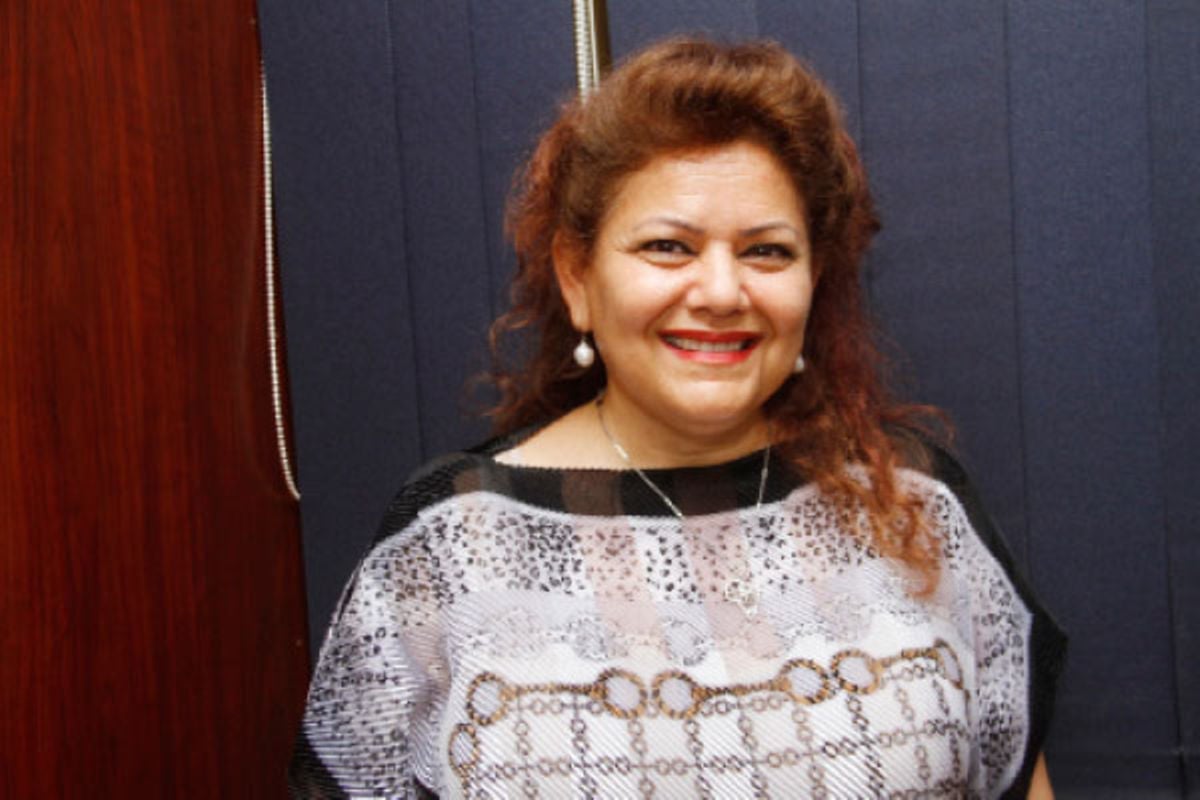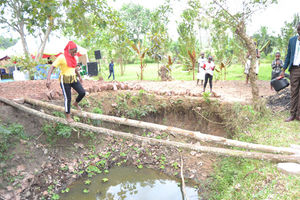
Ms Maria Park Kim (3rd left), the director of Africa Institute of Music, is joined by guests to plant a tree at the institute in Lubowa, Wakiso District, to commemorate 20 years of existence. Tree planting is encouraged to restore the environment. PHOTO/ EDGAR R. BATTE.
Uganda continues to return a mixed eco-tourism scorecard even as many hotels, lodges and workplaces the world over phase out use of plastics and switch to use of recyclables.
Plastic is disastrous to the environment, with far-reaching effects because it is not biodegradable in the short term. The United Nations observes that plastic material can take up to 1,000 years to break down, so when it is discarded, it builds up in the environment until it reaches a crisis point. This plastic pollution chokes marine wildlife, damages soil and poisons groundwater, and can cause serious health impacts.
Down to the communities that border tourism attractions like the prized mountain gorillas, there is need for sensitisation of people to appreciate the need to conserve wildlife, their culture and the like, for posterity for the direct and indirect benefits that accrue out of it.
The need to protect, preserve and conserve the environment has become a crucial topic, with messages alive to the urgent need to contribute to the conservation of water and other resources as key contributions to regeneration and reduction of the negative impacts of tourism on the environment or mother nature.
As such, it is not unusual for a tourist to make a conscious choice of booking to stay in a facility whose footprint on the environment is zero to negligible. Not to be left out or isolated, many hospitality facilities in Uganda are cautious in their operation to promote sustainable tourism.
Racheal Nakaliisa, a hotel manager, notes that sustainable tourism involves travel practices that protect the environment, respect local cultures, support local economies, and ensure tourism can continue in the long term without harming the destinations.
Heleen Meijer, a hotel owner in Fort Portal Tourism City, understands sustainable tourism to be a reduction of the negative impact and increase the benefit of tourism on environmental, economic, and socio-cultural aspects.
Joseph Abayo, a safari consultant understands sustainable tourism to be practices of a chain minimising negative effects of activities by tour operators and other entities with tourism value.
“This means, to maximise current profitability and enjoyment without impeding future generations from enjoying the same wildlife and environment,” Abayo explains, adding that his inspiration to promote sustainable tourism comes from the need to ensure future generations enjoy the natural endowments just as the current generation.
Caring for the environment
Sustainable tourism is borrowed from the UN sustainable goals agenda and looks at how mass tourism has intoxicated the environment within a limited period. At a personal level, Nakaliisa says her inspiration to promote sustainable tourism comes from the desire to preserve the beauty and integrity of travel destinations for future generations, support local communities, and reduce the negative environmental impacts of tourism.
Meijer is inspired to see the impact of humans in general on the liveability of the earth. Her hotel and restaurant shows respect for the environment by reducing their ecological footprint using furniture made out of local fast-growing wood to solar heaters and reuse of waste materials.
“All furnishings and decorative items throughout the hotel, i.e. flower pots, were crafted by local craftsmen or artists. We use barkcloth in the public areas of the hotel. This typical Ugandan product was used in the past for clothing and blankets. We save energy by using solar heaters for warm water facilities in all the rooms and for dishwashing. If the sun is not enough for the hot water, we limit the usage of electric heater by a timer,” Meijer explains, adding that all rooms are fitted with energy-saving light bulbs, which are switched on and off automatically.
The hotel also uses a professional water filtering system (14 watts UV) to provide drinking water for customers and staff (also for their families at home), thereby eliminating the need to boil tap water.
There is separate disposal of waste: glass and plastics are separately collected for recycling. Metal is taken to scrap yards for recycling, while other waste is collected for the composting plant of the city council.
There is a three-chamber biodegrading sewage filtering system. Wastewater from the filtering system is used as underground fertiliser for the plants and trees in the hotel garden.
Nakaliisa’s hotel promotes sustainable tourism by encouraging eco-friendly travel practices, supporting local businesses, educating tourists about cultural sensitivity, and advocating for policies that protect natural and cultural heritage.
“At our hotel, we focus on reducing our carbon footprint through energy-efficient practices, water conservation, and waste reduction. For example, we use solar panels, implement recycling programmes, and encourage guests to participate in our linen reuse initiative,” Nakaliisa reveals.
She adds: “We are committed to supporting the local community by sourcing locally-produced goods and employing locals, ensuring the economic benefits of tourism are distributed fairly thus aiming at creating a sustainable business model that not only profits but also contributes to the local economy. We partner with local businesses and artisans to offer authentic experiences and products to our guests.”
Walking the talk?
So, how far has Uganda steered towards adapting to sustainable tourism?
“Uganda’s tourism has been birthed through wildlife and nature tourism, nothing else. From the colonial periods of game hunting, to our post-independence, many tourists have been flocking Uganda for wildlife fantasies. This was not sustainable,” Abayo says, adding that the current government has steered sustainable tourism to its feet by abolishing wildlife hunting and strengthening the conservation assets.
Owing to this, gorillas, chimpanzees, elephants, pangolins, shoebills, lions, among other animals, have sprung up. This, Abayo proceeds to note, has consequently “improved the quality of tour operators and safari lodges in the sustainable arena by training guides and operators with licences.”
To qualify Uganda’s status as a sustainable destination, Abayo points to the regulation of “the number of visitors for a gorilla trek per family, for example, littering is prohibited, and earnings from tourism help both wildlife restoration and community empowerment.”
Nakaliisa agrees, pointing to significant strides made “by developing eco-tourism initiatives, promoting conservation areas like national parks, and encouraging community-based tourism projects that benefit local populations.”
Meijer, however, reckons that there is work to be done.
“Uganda adapts primarily in word to this trend. Everyone calls himself eco-friendly, while in practice, not much is done. The commercial advantage of being sustainable or eco-friendly is often the only inspiration,” Meijer offers.
Jane Goodall, a global conservation icon, observes that, worldwide, tourism accounts for over 9.8 percent of the global GDP. This means one in 11 people are employed within the tourism sector, clearly demonstrating the crucial part tourism plays in local and international economies.
Even though tourism is a major part of the economy and allows people to experience different cultures and places, Goodall points out that it can often be seen as detrimental to both the local environment and culture.
“It’s much easier to measure the amount of trash produced by tourists versus locals than to determine the cultural impact of an expanding tourism industry,” she explains, adding, “For tourism to truly be sustainable, you have to take into account social and cultural factors along with the environmental factors.”
Goodall proceeds to note thus: “Often times, commercial resorts are built on picturesque natural landscapes, often in poor countries. Besides the benefits of employment opportunities, there may not be many more benefits for locals. One example of this is on the island of Mauritius.”
Her three tips on becoming a better tourist include educating yourself about the culture of the place you are going to in order to be more respectful of the locals, not opting for convenience. By that, you carry a reusable or recyclable water bottle and also think of the place you are visiting as your own home and take care of it as you would your own home.
Having the gorillas’ back
At Mahogany Springs, management has been phasing out plastic water bottles. Barrie Gotch, the managing director, says refillable bottles are stocked in the facility’s rooms.
“We offer a tree planting project where clients can begin to offset some carbon from their trip. We use large refillable soap/shampoo dispensers in the rooms. We use solar power wherever possible in the rooms and around the property,” Gotch discloses.
Mahogany Springs is situated in Buhoma at the edge of Bwindi Impenetrable Forest and National Park, which is home to the mountain gorillas.
Praveen Moman, the founder of Volcanoes Safaris, has hosted a TedX Talk on the company’s focus on community and conservation projects.
“If you want the gorillas to survive, you need to make conservation part of an economic mainstream,” he reasons. “We need to find a way of making sure tourism and other sensitive industries can protect Africa’s forests, put bread on the table and give the children of Africa a chance to have an education and a better future. They too, want a share of the growing wealth and health of the world, and this is not some new thought.”
Esme Stewart, Volcanoes Safaris’ partnership Trust Project supervisor, observes that sensitive and controlled tourism has an essential role to play in conservation.
Wildfriends Africa Safaris encourages tree planting among communities, as well as sensitising local communities about conservation and climate change, partnering with eco-friendly lodges, support towards community and cultural tourism and economies by buying from indigenous enterprises.
“We brief our clients never to litter and encourage them to support local communities. We try to minimise the use of fossil fuel and emission of greenhouse gasses,” Joseph Abayo, a safari consultant , says.








